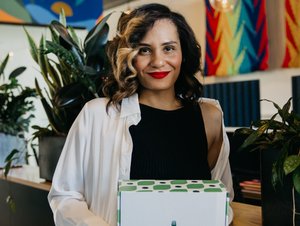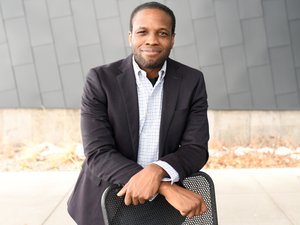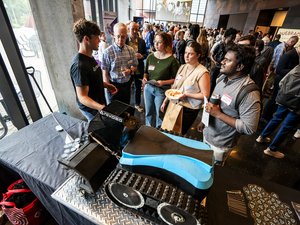
Rob Walling is no stranger to bootstrapping companies. As a serial entrepreneur for more than a decade, he's built and exited several successful SaaS startups with minimal outside funding. Most recently, he sold his marketing startup Drip to Leadpages in 2016 after raising just a small seed round.
"It's hard to build a startup," Walling told Minne Inno. "When you bootstrap, you tend to do that on the side. For a lot of people, that means burning the midnight oil for five years. It's a really difficult way to start a company."
In order to help fellow bootstrappers, Walling started TinySeed, which he says is the first accelerator program designed for self-funded software startups.
Like other accelerators, TinySeed takes a small amount of equity in a company in exchange for mentorship and funding. In this case, participating companies will receive between $120,000 to $160,000 depending on the size of their team.
But TinySeed is also shaking up the standard accelerator format in several ways. Most notably, it will go for one year (rather than the typical three months), and the 10 participating companies aren't required to relocate for the duration of the accelerator. TinySeed just asks that they are located somewhere in the Western Hemisphere.
TinySeed will also forgo another accelerator tradition: demo day. At the end of a lot of programs, the companies pitch their progress in an attempt to raise a seed or Series A round. Because TinySeed is designed for bootstrappers, this is not the end goal for its startups. Which gets to the heart of TinySeed's unique model: focusing on growth through revenue rather than raising venture capital.
"When it comes to venture capital, you need to know what you're getting into," Walling said. "The media glorifies raising funding so much that it seems like the end goal to some people. But it's not. It's the start of the journey. And it only gets more difficult from there."
That doesn't mean bootstrapping is any easier – not even a little bit. Walling is quick to bring up the many headaches from his experiences as a bootstrapping founder and 11-time angel investor. But he believes that there are other ways to build a company other than venture capital.
TinySeed companies don't need to exit for the accelerator to work, Walling explained. The program is set up in a way that will hopefully make founders and investors happy. The companies don't need to sell in order for investors to get a return. Instead, investors profit through a dividend/share model.
Walling hopes this structure helps startups grow at a healthier pace and don't need to force growth to raise their next funding round.
"Being surrounded by founders facing some of the same challenges is extremely powerful."
Walling started MicroConf, an annual conference for self-funded software entrepreneurs, about seven years ago. He first shared his idea for TinySeed at MicroConf 2018.
"The response was off the charts," Walling said. "We had all these big bootstrappers reaching out to us asking how they could help. It was early validation that there's interest from both founders and investors."
Walling began collecting thousands of email addresses from people interested in getting involved with TinySeed. More than 900 teams applied to participate in TinySeed's inaugural accelerator cohort, according to Walling.
Ultimately, that pool will be narrowed down to just 10 SaaS startups. The program will kick off next month. TinySeed recently closed on around $4 million in funding, which will back several cohorts, Walling said.
TinySeed is part of a small but growing corner of the startup world offering alternative funding methods to venture capital. The accelerator was listed in a New York Times article earlier this year among groups like Lighter Capital, Purpose Ventures, XXcelerate Fund and Indie.vc. Each of these firms and funds offer different ways for founders to grow their companies while not giving over all control to investors.
In addition to providing founders with capital and mentorship, Walling hopes TinySeed creates a community of entrepreneurs that support each other as they continue to grow their businesses.
"The mental and emotional side of entrepreneurship is extremely taxing," Walling said. "When it comes to boostrapping, you're always thinking, 'Am I doing this right?' To be surrounded by founders facing some of the same challenges is extremely powerful."








